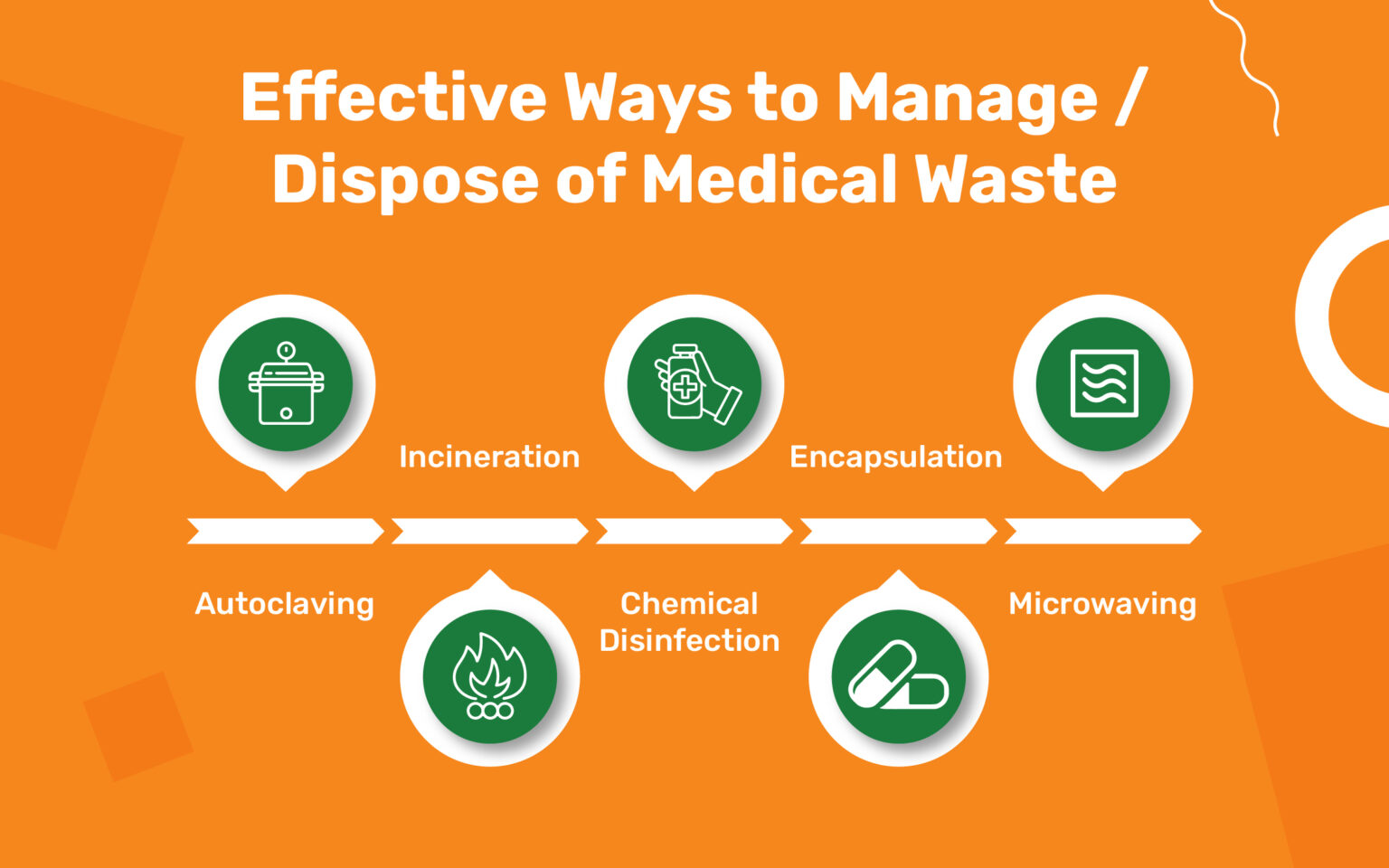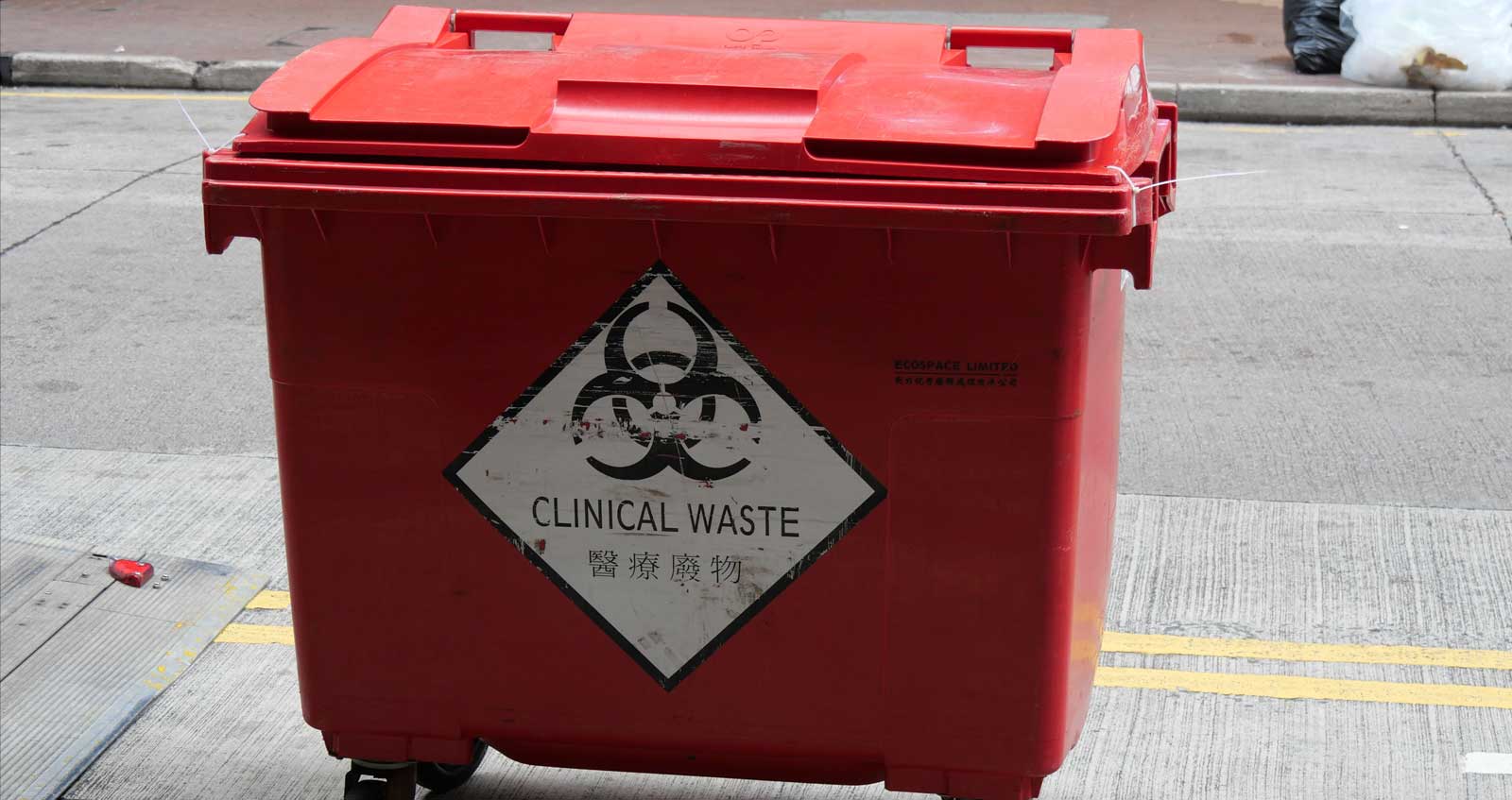Medical Waste Removal Excellence: Elevating Security Specifications in Your Center
Medical Waste Removal Excellence: Elevating Security Specifications in Your Center
Blog Article
Remain Ahead of Rules: Expert Recommendations on Medical Garbage Disposal
In a globe where the medical care sector is continuously progressing, it is imperative for clinical centers to stay ahead of guidelines when it concerns the correct disposal of clinical waste. With stringent standards and frequent regulatory modifications, it can be challenging to browse the complexities of this procedure. With experienced suggestions, facilities can ensure conformity and minimize dangers associated with incorrect waste disposal. From understanding the various groups of clinical waste to executing the appropriate collection and partition methods, this discussion will certainly offer actionable tips and valuable insights to aid centers stay ahead of policies in the ever-changing landscape of clinical waste disposal.
Understanding Medical Waste Categories
Understanding medical waste groups is important for appropriate disposal and management in health care centers. Clinical waste describes any kind of waste produced by healthcare activities that might present a threat to public wellness or the atmosphere. It is important to classify medical waste precisely to ensure its risk-free handling, transport, treatment, and disposal.
There are a number of categories of clinical waste that healthcare facilities require to be familiar with. The most usual classifications consist of transmittable waste, pathological waste, sharps waste, pharmaceutical waste, and chemical waste. Each classification has certain guidelines and laws for its proper monitoring and disposal.
Infectious waste includes products infected with blood or various other physical fluids, such as handwear covers, gowns, and lab societies. Pathological waste refers to human tissues, organs, or body parts that need special delivery and disposal. Sharps waste consists of utilized needles, syringes, and other sharp things that can cause injury and send infections. Pharmaceutical waste makes up expired, unused, or contaminated drugs that require mindful handling and disposal. Chemical waste consists of solvents, anti-bacterials, and other chemical compounds made use of in health care facilities.
Remaining Up-To-Date With Regulatory Changes
Staying present with regulatory adjustments is crucial for health care centers to make sure compliance and appropriate monitoring of clinical garbage disposal. medical waste removal service. With guidelines regularly developing, it is necessary for healthcare facilities to stay current to prevent fines, fines, and possible harm to the environment and public wellness
To remain ahead of regulatory modifications, healthcare facilities must establish a system for surveillance and monitoring updates. This can be done by registering for regulative newsletters, attending workshops and meetings, and actively taking part in market associations. Furthermore, facilities need to assign a personnel or group accountable for staying notified and disseminating information to pertinent stakeholders.
Regular interaction with regulative agencies is also crucial. Health care centers need to develop partnerships with local, state, and government companies to ensure they are conscious of any type of adjustments in policies that might impact their waste monitoring techniques. This can be done via routine meetings, engagement in public remark durations, and positive engagement with governing firms.
Additionally, health care centers should think about partnering with waste management business that specialize in medical garbage disposal (medical waste disposal services with WasteX). These business are usually skilled in the current policies and can offer guidance and support to make sure conformity
Carrying Out Correct Collection and Partition Approaches
To properly handle medical garbage disposal, healthcare facilities must establish proper collection and partition approaches in accordance with regulative standards. Carrying out these approaches makes certain the secure handling and disposal of possibly hazardous materials, protects the environment, and decreases the threat of infections and injuries to health care employees and the basic public.
Appropriate collection and segregation approaches include making use of designated containers and identifying systems. Healthcare centers should give clearly labeled containers for various kinds of medical waste, such as sharps, infectious waste, pharmaceutical waste, and non-hazardous waste. These containers should be color-coded and clearly marked to prevent confusion and promote simple identification.
Additionally, medical care facilities should train their personnel on the appropriate procedures for accumulating and setting apart clinical waste. This includes enlightening them on the various sorts of waste, the proper containers to utilize, and the relevance of complying with guidelines and standards. Routine training sessions and refresher training courses should be carried out to make sure that team member stay updated web link on finest methods.
Additionally, medical waste disposal services with WasteX medical care centers must develop a system for routine collection and disposal of clinical waste. This may involve partnering with accredited waste management business that focus on medical garbage disposal. These companies will make sure that the accumulated waste is delivered and gotten rid of in conformity with regulative requirements.
Picking the Right Disposal Approaches

Incineration is among one of the most typical and effective approaches for taking care of specific types of clinical waste, such as pathological waste and sharps. It includes the regulated burning of waste at heats, minimizing it to ash. Incineration can launch damaging contaminants right into the air and contribute to air contamination.

Chemical therapy involves the usage of chemicals to disinfect and counteract the waste. Microwave therapy uses microwave energy to warm and decontaminate the waste.
Ensuring Conformity With Paperwork and Training
After thoroughly considering the proper disposal methods for clinical waste, medical care facilities must ensure conformity with policies and decrease ecological influence by executing efficient paperwork and training treatments. This action is crucial in preserving a lasting and safe atmosphere for both healthcare employees and the basic public.
Health care employees that manage clinical waste should get proper training on waste partition, taking care of, and disposal treatments. By giving thorough training, healthcare facilities can equip their personnel to make informed decisions and minimize the risk of inappropriate waste disposal.
Final Thought
In final thought, staying ahead of regulations in medical garbage disposal is crucial for medical care centers. medical waste removal near me. Comprehending the different categories of clinical waste, staying updated with regulative adjustments, applying correct collection and segregation approaches, picking the ideal disposal methods, and making certain conformity with documents and training are all necessary actions. By following these standards, healthcare companies can successfully take care of and get rid of of clinical waste in a liable and risk-free fashion
From comprehending the different classifications of medical waste to executing the best collection and segregation techniques, this conversation will provide workable suggestions and valuable understandings to assist facilities stay in advance of guidelines in the ever-changing landscape of clinical waste disposal. - medical waste disposal services with WasteX
The most usual categories include transmittable waste, pathological waste, sharps waste, pharmaceutical waste, and chemical waste. Healthcare facilities ought to supply plainly classified containers for various kinds of clinical waste, such as sharps, contagious waste, pharmaceutical waste, and non-hazardous waste. Health care centers must develop a thorough system to videotape and track all aspects of clinical waste disposal, consisting of check this kinds of waste produced, amounts, and disposal techniques utilized. Health care workers that handle medical waste needs to receive suitable training on waste segregation, managing, and disposal procedures.
Report this page